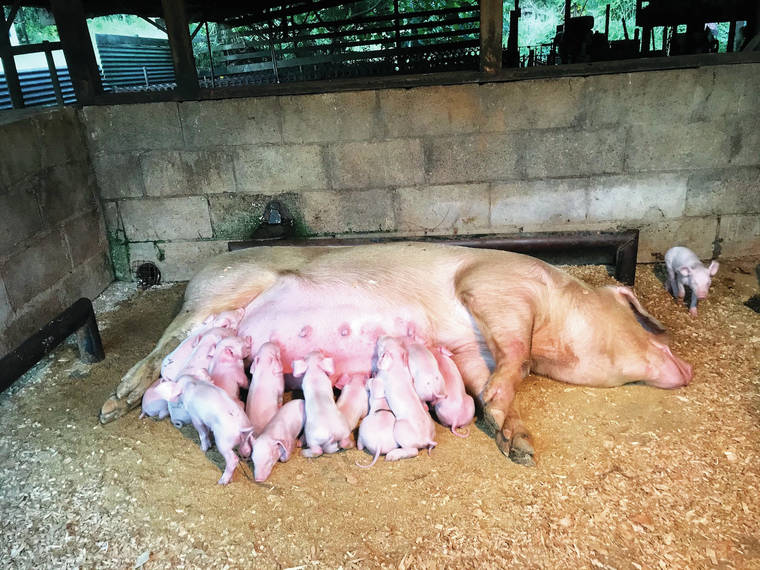LIHU‘E– Kaua‘i pig farms aren’t getting their usual food scraps from local schools, restaurants and hotels since they’re closed due to COVID-19, and farmers are asking the community to pitch in and help keep the hogs fed.
Local stores do sell pig feed, but many farmers rely on food waste from small businesses, restaurants and resorts to make feeding time more affordable.
It’s a practice employed by generational farmers on Kaua‘i, as well as new pig farmers, hoping to increase local food production on the island, according to Savannah Katulski, livestock extension agent with the University of Hawaii College of Tropical Agriculture and Human Resources (CTAHR).
One local farmer, Patty Lyons has been raising pigs on Kaua‘i since the early 1970’s and uses scraps from businesses to feed her animals.
“We want to give our pigs the best life possible. They thrive on homecooked slop from our local restaurants and eateries. We make sure they are happy until it is time for them to nourish our customers and their ohana,” Lyons said.
But, without a stream of scraps coming out of restaurant kitchens — take-out and delivery options have cut down on the in-house food waste for most eateries — Lyons and other pig farmers on Kaua‘i are having to shell out more money to keep their farms afloat.
Katulski’s goal is to connect farmers like Lyons with people in the community who “may be able to provide a significant amount of additional food waste to pork producers.”
All Kaua‘i residents are invited to help out. Katulski suggests people team up with neighbors and friends to collect food waste for pig farmers. In addition to restaurants, resorts, or food service entities, Katulski wants to connect farmers with produce growers who have crops or food they can’t sell or harvest, and residential communities that accumulate a large amount of food waste.
“The goal is to be able to accumulate a 55-gallon barrel of food waste in order to significantly impact feed needs,” Katulski said.
Farmers generally ask that food scraps and waste doesn’t contain plastic, metal, glass or any other non-food items. In addition, farmers are looking for food waste doesn’t contain a large amount of citrus or fish bones — and that the food waste is no more than about two days old.
“Individual farmers many have other preferences that I am not listing here, but those can be discussed individually between the supplier and the farmer,” said Katulski.
Farmers get another leg-up with a grant being managed by CTHAR and the Hawaii Department of Agriculture — about $20,000 from the company Ulupono Initiative dedicated to helping mitigate some of the financial burden of a feed shortage.
While other avenues are also being explored to add additional funds to this project, Katulski said the money’s purpose is to provide subsidies or reimbursement to feed stores so they can lower prices. The goal is to lower pig feed prices by $4 or $5 for a 50-pound bag of feed.
Info: katulski@hawaii.edu.






feel bad for the farmers, but extra food should be fed to the homeless;